Follow The Covid Rules Or Get Kicked Out, Cambridge Tells Students

Students at a Cambridge college have received a coronavirus “Community Statement” that they must sign and adhere to or risk being ejected from college accommodation. Lockdown Sceptics has seen the draconian rules issued by Trinity College to its students and it’s a shocker. It states:
You are required to sign this statement and adhere to it if you would like to return to, or remain resident in, College accommodation. No accommodation for the new academic year will be allocated until you return a signed copy of this statement. The Senior Tutor and Junior Bursar can withdraw your accommodation if you breach your commitment to follow the Community Statement.
The rules, sorry, I mean “community guidelines”, include being prepared to move rooms or leave at “very short notice”, rigorous cleaning duties, no visitors, being limited to the bare minimum of possessions for “basic living standards”, and a requirement to store in your room “three days’ supply of non-perishable food for use in the event of a lockdown”. Parties are “likely to be deemed a grave breach”. The rules can change at any point. (The Guardian also has the story.)
It is left entirely up to academic supervisors whether they will teach their students in person, leaving many at risk of a substandard education. As one university lecturer told us: “I have been at the receiving end of online teaching, and it is absolutely not as good as the real thing. Even in a small group you lose the immediacy, your attention drifts, and your tutor loses the body language necessary to get a feel of how you are responding to the instruction.”
New students were told before term began that they cannot defer their place if this is not to their liking. It’s our way or the highway at Trinity College, Cambridge. The college which, over the course of its history, has won more Nobel Prizes than France and Belgium combined has turned into a citadel of unscientific, hysterical group think. Perhaps it’s because the new Master is Sally Davies, the former Chief Medical Officer.
Treating young people in this way is cruel. Dressing it up as a “Community Statement” which “represents a commitment” by students – a commitment they had no choice about whether to make – is Orwellian doublespeak. If they don’t make this supposedly voluntary “commitment”, they lose their place at Cambridge.
We are used to “Generation Snowflake” complaining of micro-aggressions and wanting safe spaces and trigger warnings – fatuous nonsense, which is nonetheless frequently indulged by university authorities. Yet here we have a genuine example of oppressive treatment likely to cause harm to students’ well-being and mental health that’s due to the snowflakery of the grown ups. All in the name of protecting people from this “deadly” virus. Yet a recent analysis by Professor David Spiegelhalter in the BMJ has shown that the risk to people under 35 is almost zero.
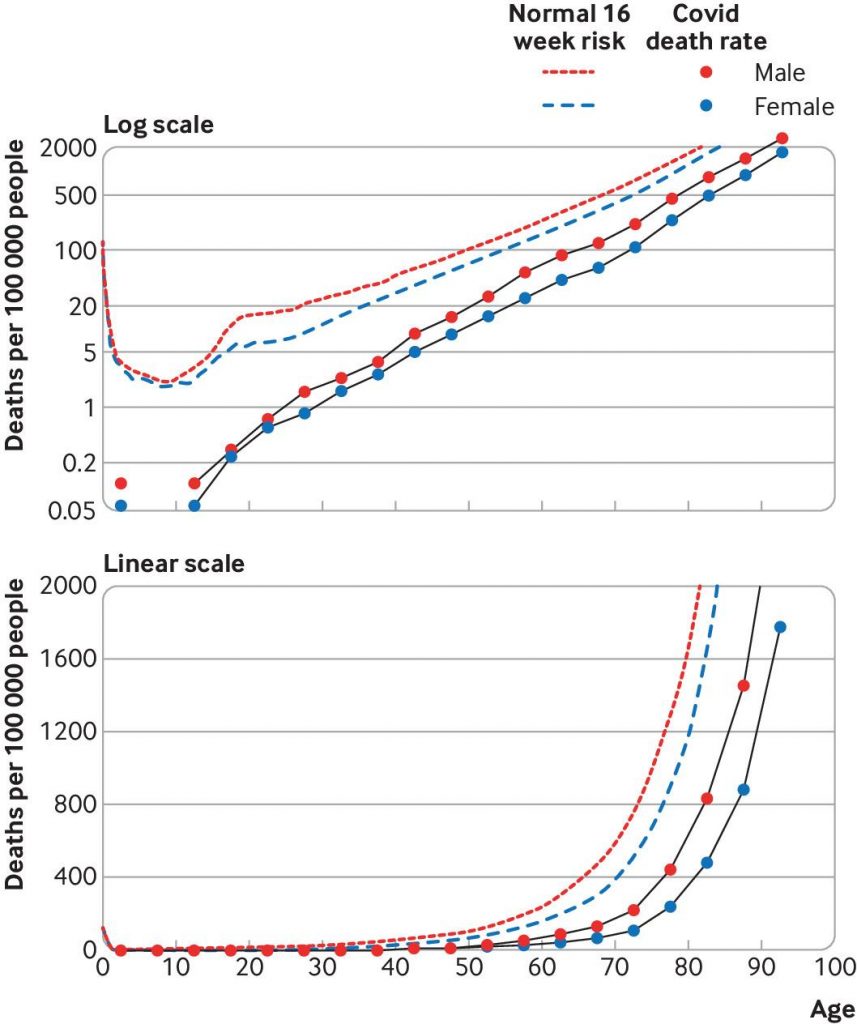
All these rules and restrictions are in place for the benefit of much, much older people suffering from co-morbidities, in other words. What a dreadful burden to impose on the young, who have already had their education disrupted, their exams cancelled and been put through an A-Level grades fiasco which left many of them unsure whether they’d get a place at university until the last minute.
Students are informed at the end of the Statement that the College has “a Mental Health and Wellbeing Advisor as well as a Counsellor”. They’re going to need them.
Boris Needs to Look Again at the Facts About Covid

Too many people still assume that lockdown is the only thing that stood between us and Armageddon, and that restrictions of varying severity must continue until there is a vaccine or a cure. But is that what the evidence tells us? I wrote a piece for the Spectator yesterday making the case that Boris and the Government need to look again.
To get to the truth of what is happening – and to work out the approach we need to take – we need a control, something to show what happens when things are done differently. Peru offers one possible example: it has one of the world’s strictest lockdowns, yet also the world’s highest official death toll, at a rate of 929 per million. We also have Sweden, which favoured a light-touch approach; there has been no new big rise in cases or deaths and the country’s economy is getting back on its feet.
Critics point out that Sweden fared significantly worse than its Nordic neighbours, with 578 deaths per million, compared to Denmark’s 109 and Finland’s 61. However, Sweden, which never took on the burden of indefinite suppression, is now in a much stronger position to contemplate a return to normal life.
What’s more, an international comparison in the Lancet in July offered little conclusive evidence connecting the timing and strictness of lockdown in a country and the COVID-19 death rate. Yet still our leaders insist that wide-ranging restrictions on social and economic life are the best way to respond to this threat.
The public can be forgiven for overestimating the severity of the virus, having been subjected to a barrage of terror for the past six months. But the government and its advisers have no excuse. They ought to have twigged by now that, for most people, the threat has been overegged and the response to it far out of proportion to the danger it poses. Being able to step back and reappraise evidence and change direction in light of that – and then, crucially, bringing the public along with you – is an essential characteristic of a good leader and one that we are in desperate need of right now. On this count, Boris is failing badly.
Read the whole piece here.
Stop Press: The Lancet has set up a commission under economist and UN adviser Jeffrey Sachs to investigate the world’s response to the virus. Unfortunately, it begins with the assumption that lockdowns work and are necessary. Sachs told the Telegraph: “What we have learned, I think, about the public health response [to date] is that even though this is a devilish virus it is controllable. Around two billion people live in countries that have substantially suppressed the virus. They’ve been able to do that, primarily because of public health means, and especially these non-pharmaceutical interventions [extreme social distancing measures]. But if we look at the UK, the US, and western Europe, we failed to put such policies in place basically until now. In the US we still don’t have an effective control system.” Only just put social distancing in place now? What is this guy smoking? And what is the point of an “investigation” into the world’s response if it takes it for granted that the thrust of that response – to indiscriminately quarantine entire populations, the healthy as well as the sick – was correct before it’s concluded? Seems to be yet more self-justifying delusion from the global elites who got us into this mess.
Naked Scientist Sees the Light

Dr Chris Smith, a virologist at Cambridge and known on TV and radio as the “Naked Scientist”, has been a regular on BBC Radio 5 live throughout the pandemic, co-hosting “Commonsense coronavirus call-in” on Saturday afternoons with Colin Murray. At the start of the outbreak on March 12th he was among the doomsayers, predicting 50-100 million deaths worldwide (the current total is around 943,000). Now, however, he seems to have changed his tune. Discussing an interview with Lord Sumption that had occurred on the station earlier in the morning, he appears to go a long way in agreeing with the former judge. A reader has transcribed the exchange for us:
Dr Chris: What he’s [Lord Sumption] basically saying is that it’s unsustainable to carry on the way we are, because if we do we won’t have an economy to prop up the standard of living to which we’ve all become accustomed, and I think that is true; we do have to come up with a solution soon. The difference between March, when we didn’t know much about this outbreak and now, is that we do know a lot more about it. We know who is susceptible, we know how to stop it, and we know what we need to do to stop it, and I think therefore we do need to adjust. Rather than regard this as a blunderbuss thing, we just lock the country down, and I do agree with him completely that it is an absurd notion to think we just suppress the virus by keeping everyone under lock and key. That’s just not going to be possible, so we do have to have an alternative.
It’s clear there is not going to be a vaccine any time soon. We’re talking perhaps six months away still at the earliest before we’re properly in a position to move on this, and we don’t even know if we do get a vaccine that it will work, so we do need a Plan B. Perhaps that Plan B ought to be that, because we know who’s most at risk, we do our utmost to protect those people who are most at risk, and we afford much more flexibility and freedom to people, at their discretion of course, to go about their business as they see fit, so that we have done the most we can to protect the people we know are most at risk, and support the people who want to go out and about and do their own thing, and that to me seems like a reasonable compromise given what we now know about this virus.
Presenter: So this would be shielding the most vulnerable, getting them to stay at home, and then letting the younger people go about their daily business?
Dr Chris: Well it doesn’t matter whether you’re young or old. If you’ve got an illness or some kind of problem that means you’re at high risk, then we should be doing our absolute utmost to protect you. But those people are the few in amongst the vast majority in the country who are not at high risk from this, let’s be honest. We now know a lot more about what the risk factors are, we know who we should be protecting, and we know how to protect people, and the evidence for that is that although we are seeing rising numbers of cases in the country, particularly among younger people, we’re not seeing that mirrored in the older generations quite yet, and so as a result that suggests that those people are being cautious, being careful, and those efforts are being rewarded in them by them not catching it. We mustn’t be complacent here; it may be, as people are suggesting, that we may see a filter through, with more young people’s cases turning to more older people’s cases later, and that may translate into more mortalities, but for now that isn’t the case, and perhaps we should be willing to consider it and its implications rather than immediately move towards more of the suppression approach, which all it does is kick the can down the road.
Postcard From Tanzania
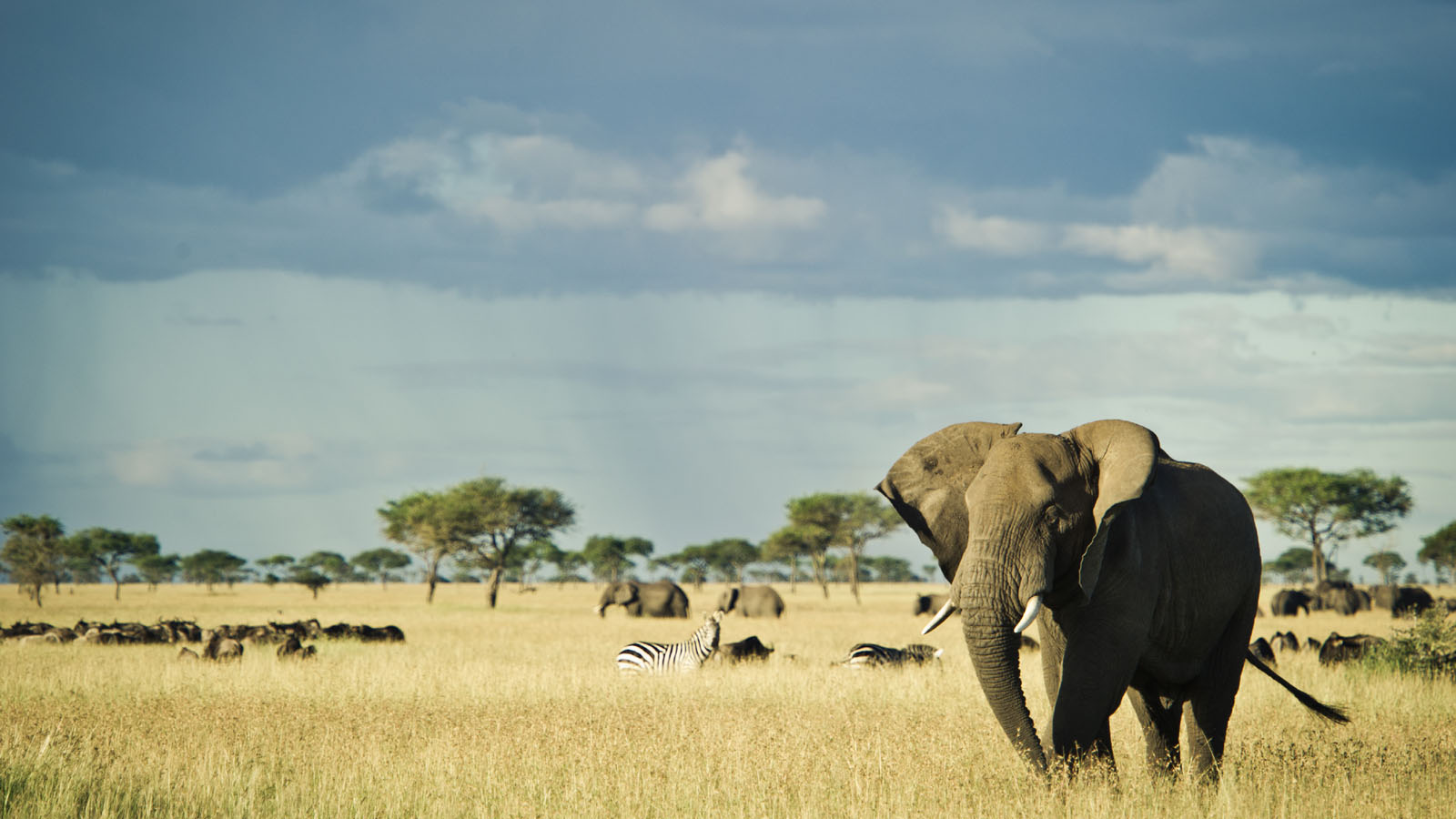
Lockdown Sceptics long ago identified John Magufuli, the President of Tanzania, as one of the few world leaders to emerge from the coronavirus crisis with any credit, having rejected the advice to lock down his country because of his well-founded doubts about the false positive rate of the PCR test. As readers will recall, he ordered the army to carry out a range of tests when his doubts set in and both a goat and a papaya tested positive.
A reader, Tony Hughes, has sent us a postcard from Tanzania, where he lives, and confirms that it’s one of the few places in the world that hasn’t completely lost its mind.
Thank goodness we live in Tanzania. It may be a ‘developing’ country (GDP per capita is 40 times less than that of the UK) but in the ‘fight’ against Corona its people have retained their freedoms and liberties unlike those in many nations where these very concepts are championed as a mark of civilisation. Tanzanians – from 100 or more tribes – are among the most polite, respectful and tolerant people in the world. It is therefore unsurprising that the Government’s response has been thoughtful and balanced – despite the derision poured on it from the international media and other organisations, many with an interest in selling fear. Indeed, if the mark of a statesman is thinking of the next generation (rather than the next election), then the President’s outlook is a lesson that should be learnt by every other African and world politician.
So what sets Tanzania apart? First and foremost its current leaders understand the limitations of scientific modelling and testing, which in this pandemic so far, seems solely to have been used to produce a convenient outcome. Though much mocked at the time, Tanzania discovered very early that papaya, among other things, can return a positive Corona result. It is now, months later, amusing to see that the world is only just getting to acknowledge the problem of false positives.
This is not to say that Tanzanians have simply put their heads in the sand and ignored the virus. Everyone has a fear of the unknown. The Government’s initial public health response was decisive and quick. Right from the beginning, standard hygiene policies were introduced – even the smallest ‘duka’ (shop) provided facilities for hand sanitising, while temperature checks were made available in all larger shops, offices, hotels and other public places. Schools were also shut, team sports suspended and quarantine introduced for international arrivals – which restrictions were all lifted months ago as increasing knowledge suggests the virus is no worse than many of the diseases Tanzanians have to live with. More than this, however, its leaders know that development challenges are hard and poverty kills just as surely as any virus (though not necessarily the rich). Life expectancy is just under 65 years. The political response has therefore been great, the hopes and aspirations of ordinary Tanzanians have been put first – the median age is just 18. Though similarly mocked in the international press, this was done using language to help its deeply religious population remain aware but stop fixating on the virus, preventing the mass hysteria that had seemly affected so many in the UK and other parts of the world.
Tanzania is great place to visit, especially in these uncertain times. Want to wear a mask, socially distance or self-isolate (in some of the largest wilderness areas remaining in the world) – up to you. No one will judge or confuse you with a thousand little rules.
Big Brother’s NHS
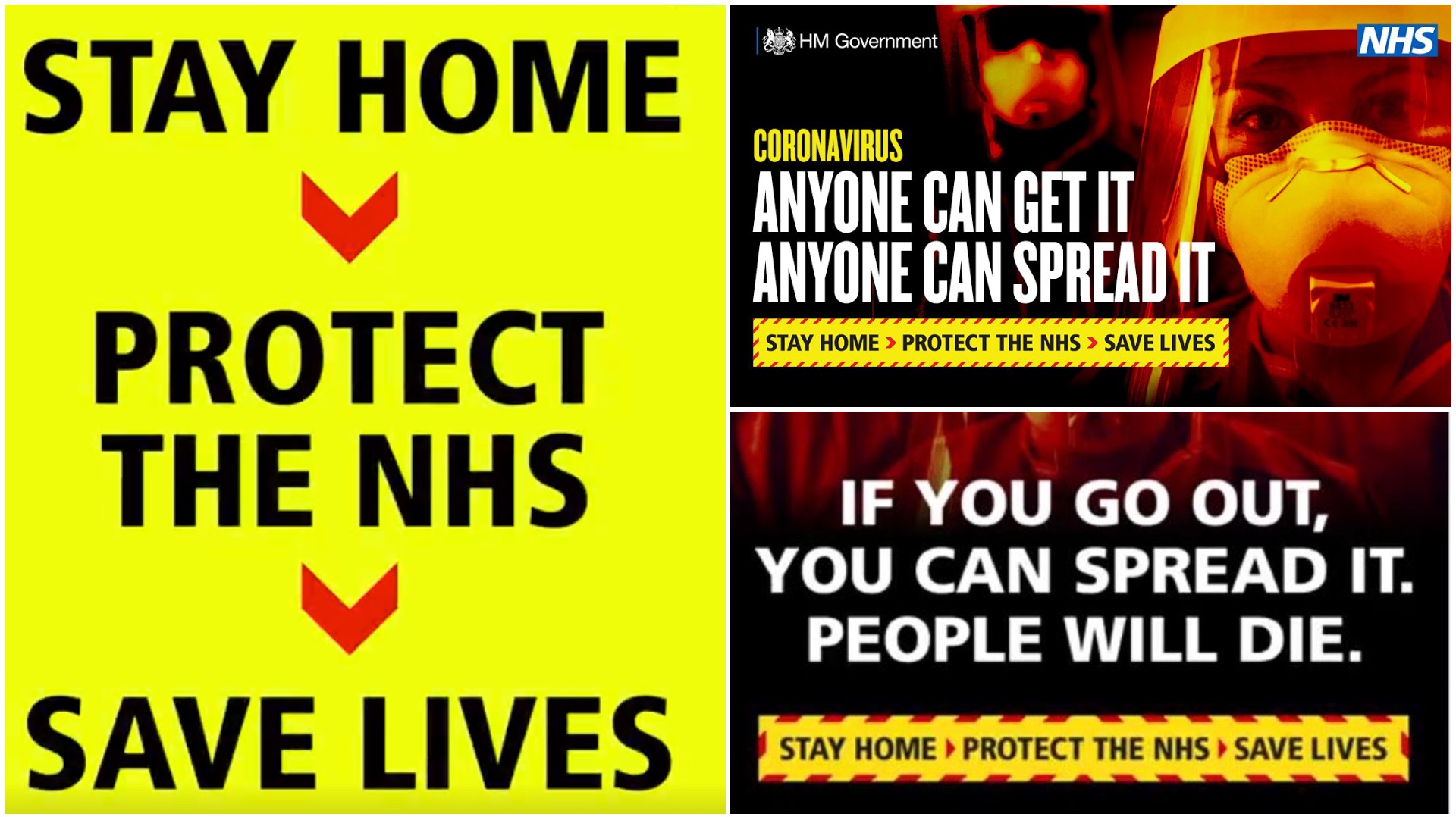
Toby’s friend Tom Hodgkinson, who edits the Idler, has passed on a comment from his dad Neville, who worked as a medical and science journalist for British newspapers for 20 years. Neville has given us permission to republish. Hard to disagree.
From needing to protect “our NHS” (which is actually Big Brother’s NHS) from being overwhelmed we went to needing to protect ourselves against a new surge of infections brought in from other countries (ruining summer hols for many), and now as testing becomes more widespread, more “cases” are used to scare us – which are not cases at all, but positive results in healthy people with PCR testing. This finds a genetic needle in a haystack, quite possibly a signal from a previous infection with another of the 100 or so coronaviruses out there. And they have spent billions on lockdowns of proven uselessness. And millions on buying up a vaccine that doesn’t yet even exist. And yet papers like the Mirror, Guardian, Indie, etc. are baying for still more interference, including Stalinesque “snitching” on neighbours who break the entirely non evidence-based instructions. Wow! National debt now over two trillion pounds’
Spain’s “Second Wave”

Hospital admissions, ICU occupancy and deaths are up in Spain, particularly Madrid, leading to some lurid news reports adding to the growing hysteria around the dreaded ‘second wave’. The Telegraph, for example, has “Fears for Europe’s hospitals as Madrid death toll grows“, which states: “Hospitals in Europe’s COVID-19 hotpots are close to saturation point, with admissions to intensive care units increasing exponentially in cities such as Marseille and Madrid.”
So are ICU admissions really “increasing exponentially” in Madrid? Here is the graph:
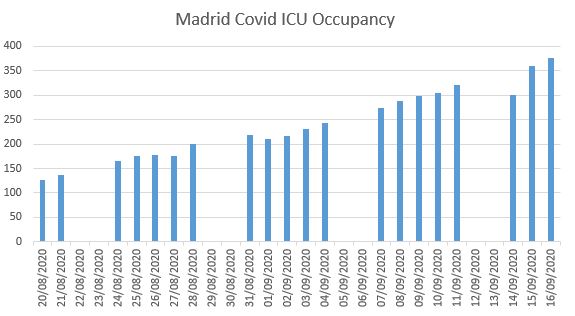
Steady growth, certainly, but not exponential. In terms of being at “saturation point”, Covid patients currently occupy 22% of Madrid’s hospital beds and 8.5% nationally, so still plenty of spare capacity. The rise so far has been steady rather than steep or “exponential”.
As to deaths, although 239 deaths were announced today, they are spread over a number of recent days. This is what the chart by date of death looks like today (note that recent days will be revised upwards in future reports):
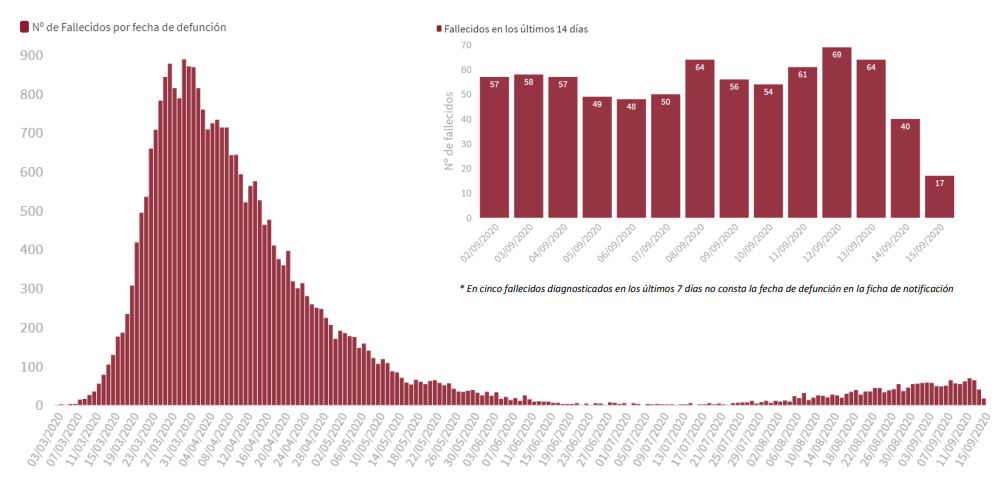
Notice how much smaller and gentler the new curve is compared to March. We don’t yet know how high it will go, but we do know it is not behaving the same as when the virus first hit.
BBC Propaganda

Longtime Lockdown Sceptics contributor Guy de la Bédoyère has been in touch to complain about the Ministry of Truth BBC.
Watched the 1pm BBC TV News today. Testing delays are the new Death Porn. They flogged the story out for 10 minutes at the top of the bulletin, doing everything conceivably possible to freak people out about a test shortage, weaving second wave references in and out, interviewing enraged test-wannabees, following the government line so slavishly they’ve managed to leave the flailing government behind unable to match testing to the extent the BBC has whipped up Second-Wave Terror. They’ve obviously all been watching Game of Thrones since the slogan du jour is “with winter approaching” (aka Winter is Coming), making it sound like twenty-feet deep snowdrifts and -40C gales are due any minute along with Monty Python ‘bring out your dead’ carts in every street.
They might as well also have shown footage of van loads of toilet paper being driven away from shops for good measure. Perhaps there is literally a newsroom textbook on how to do this. It’s all like Edwina Currie and the eggs on speed. Back in those days the BBC took a few days to destroy a whole industry – now it can crank the whole country up in hours.
You can see the entire thing spiralling out of control as a news story, accelerating, growing like a snowball, and brainwashing as many people as possible into the idea that if they so much as sneeze they have to get a Covid test at any price or die, while at the same time telling everyone the testing system is about to blow up like HMS Hood in 1941.
It’s as if the country has been consumed by a fetish for gratuitous hysteria.
What would I do if I had symptoms? As far as possible: nothing except stay at home. Who are these long-distance test hunters who drive 250 miles or more for a test? Unless they’re really essential workers, are they utterly insane? Or what is the insanity behind sending them there? Even if we assume they have the virus, how many additional people are they going to come into contact with? Still, so long as they eat constantly en route there’s no chance of putting anyone else at risk.
There’s one good quote to bear in mind – the only hope we have left:
“Hysteria takes too much energy to be maintained forever.” Mira Grant (science fiction author)
Unfortunately, the BBC seems to have plenty of energy.
Round-Up
- “Swathes of public to be refused coronavirus tests under rationing plans” – Another embarrassing disaster for the Government’s handling of Covid
- “How tragic that Coronaphobia is turning our land of liberty into a Stasi-like state” – Ross Clark adds another great piece to the Mail‘s growing tally of sceptical output
- “COVID-19 and the false positive trap” – Excellently lucid explanation of the problem of false positives by Lockdown Sceptics contributor Dr Clare Craig in the Spectator
- “China’s Global Lockdown Propaganda Campaign” – Michael Senger in the Tablet lays bare the shocking CCP social media propaganda campaign that helped send lockdown global, although our own Sue Denim says treat all reports of bot farms pumping out fake news with caution
- “Is Britain heading towards civil war?” – Asks Andrew Cadman in Conservative Woman, inspired by Douglas Murray’s comments to James Delingpole
- “We could be guinea pigs for untested vaccines” – Vlod Barchuk in Conservative Woman on the dangers of the Government’s plans to bypass key safeguards. There’s still time to respond to the consultation here
- “Are we becoming immune to the vaccine message?” – A rundown of the problems with vaccines by Dr Priyad Ariyaratnam in the Speccie
- “What Are We Waiting For?” – Another blog post by Omar S. Khan, this time wondering why people aren’t taking their freedom back
- “Patel will never make us a nation of snitchers” – Solid piece by Alice Thomson in the Times
- “Boris Johnson has six months left to save his premiership” – An optimistic forecast by Allister Heath in the Telegraph
- “Johnson’s erratic style could cost him dear” – Iain Martin in the Times senses growing discontent with the Prime Minister
- “Where’s Boris?” – Fraser Nelson expresses his doubts about Boris’s leadership in the Spectator
- “George Washington Enrolment Drops 17% in Pandemic Setback” – A sign of things to come?
- “Boris Johnson has wiped the smile from our faces” – Sean Walsh takes a philosophical look at why it’s all gone so wrong for our scientists and politicians
- “Crucial Update on the Viral Issue: a ‘Debunking the Detractors’ Special!” – Ivor Cummins responds in detail to criticism of his now famous September 8th explainer
Theme Tunes Suggested by Readers
Just one today: “We No Mingle” by Terror Fabulous.
Love in the Time of Covid
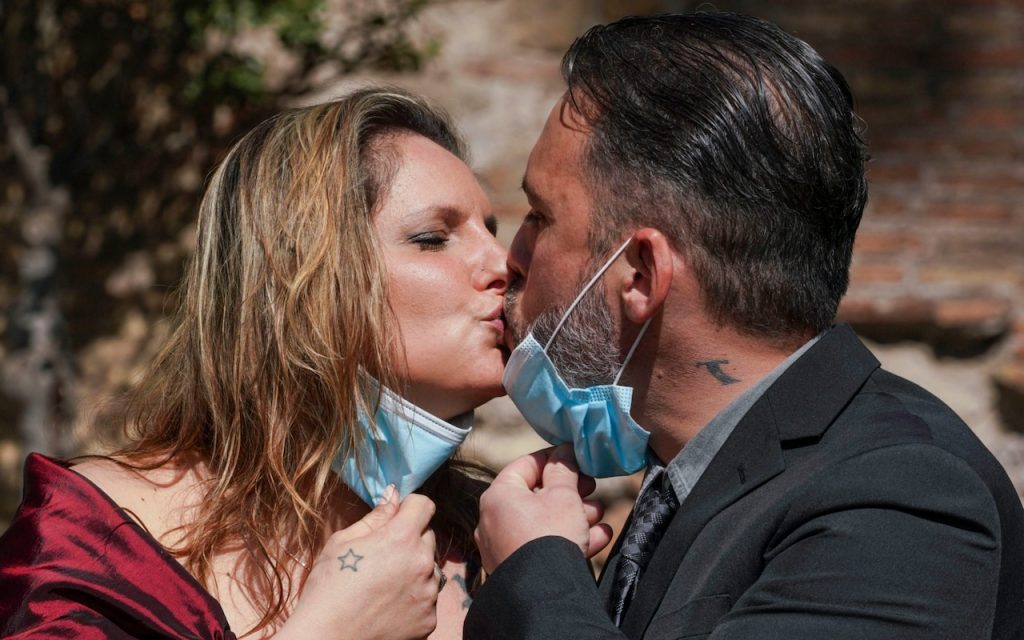
We have created some Lockdown Sceptics Forums, including a dating forum called “Love in a Covid Climate” that has attracted a bit of attention. We’ve also introduced a section where people can arrange to meet up for non-romantic purposes. We have a team of moderators in place to remove spam and deal with the trolls, but sometimes it takes a little while so please bear with us. You have to register to use the Forums, but that should just be a one-time thing. Any problems, email the Lockdown Sceptics webmaster Ian Rons here.
Woke Gobbledegook

We’ve decided to create a permanent slot down here for woke gobbledegook. Today it’s the turn of the Pitt Rivers Museum in Oxford, which recently removed its display of shrunken heads. It issued a lengthy explanation for this, including this section in answer to the question “Were these changes in response to the Black Lives Matter movement?” (Short answer: Yes.)
At the Pitt Rivers Museum, we condemn racism in the strongest terms; we work towards becoming an anti-racist institution and stand in solidarity with the Black Lives Matter movement. As a museum, we know it is important not to be silent and to lend whatever support we can, both to our own staff members, and to the broader communities that are impacted by institutionalised, everyday racism and other exclusionary practices. We express our solidarity and our recognition of how museums like ours, and collections like ours, cannot be separated from the ongoing violence and systemic racism happening in Oxford, in the UK, in the US, and elsewhere.
The guiding principles of our Strategic Plan state that we aim to be part of a process of redress, social healing and the mending of historically difficult relationships. We acknowledge that the Pitt Rivers Museum can be an uncomfortable place for people to visit. Addressing colonial, racist and otherwise derogatory language on labels and/or in database description, doing provenance research into the manner in which objects were taken (e.g. by the use of military violence or coercion) and, where requested, taking objects off display or enabling the return of objects to originating communities are all integral to that process.
We aim to be a place of listening to and learning from stakeholders and we want to be an inclusive, reflexive and thought-provoking museum, that enables audiences to perceive displays from different viewpoints. To truly live up to this, we know that we can do more, we can be better and we are committed to do so. We have a responsibility to speak out, and to ask and address uncomfortable questions which we have not asked persistently enough.
The Museum’s rootedness in coloniality comes to us in materialized form through its unique Victorian galleries, the often-problematic language of its historic labels, and the very presence of its collections. Collections like the one we steward, were largely gathered during the time of the British Empire. During this period, systems and structures used for the exploitation of resources and people, including enslavement, were set up in institutionalised form in order to accumulate wealth and power for the colonisers. Part of that system of disempowerment of local authority was through the taking of (often sacred) objects. The people who took these objects felt entitled to do so; to appropriate them in order to represent cultural practices, and to speak about and for others from eurocentric perspectives. This process of taking and categorising cultural practice was often highly problematic, as there was no acknowledgement of the views of the originating communities and no reflection on the methods used to dispossess communities of these objects.
A visit to the Museum, therefore, evokes very different emotions and feeling with different people, depending on background and walks of life. For those who have heritage or roots in regions of the world that suffered the violence of Empire, the Pitt Rivers Museum can be a very difficult and hurtful place to be, as it can be for people who have to confront ableist and heter-normative world views on a daily basis. Too often stories have been silenced, perspectives erased. Undoing this coloniality is integral to the work the Museum does today.
As Toby said on London Calling yesterday, isn’t it a little self-defeating to describe the Pitt Rivers Museum as “a very difficult and hurtful place to be” for descendants of those “that suffered the violence of Empire” if you want to encourage black, Asian and minority ethnic students to visit? It’s almost like saying, “We’re deeply ashamed of the links between the Pitt Rivers Museum and white privilege and for that reason we want to discourage non-white people from visiting in future.”
“Mask Exempt” Lanyards

We’ve created a permanent slot down here for people who want to buy (or make) a “Mask Exempt” lanyard/card. You can print out and laminate a fairly standard one for free here and it has the advantage of not explicitly claiming you have a disability. But if you have no qualms about that (or you are disabled), you can buy a lanyard from Amazon saying you do have a disability/medical exemption here (takes a while to arrive). The Government has instructions on how to download an official “Mask Exempt” notice to put on your phone here. You can get a “Hidden Disability” tag from ebay here and an “exempt” card with lanyard for just £1.99 from Etsy here.
Don’t forget to sign the petition on the UK Government’s petitions website calling for an end to mandatory face nappies in shops here.
A reader has started a website that contains some useful guidance about how you can claim legal exemption.
And here’s a round-up of the scientific evidence on the effectiveness of mask (threadbare at best).
Shameless Begging Bit
Thanks as always to those of you who made a donation in the past 24 hours to pay for the upkeep of this site. Doing these daily updates is hard work (although we have help from lots of people, mainly in the form of readers sending us stories and links). If you feel like donating, please click here. And if you want to flag up any stories or links we should include in future updates, email us here.
And Finally…
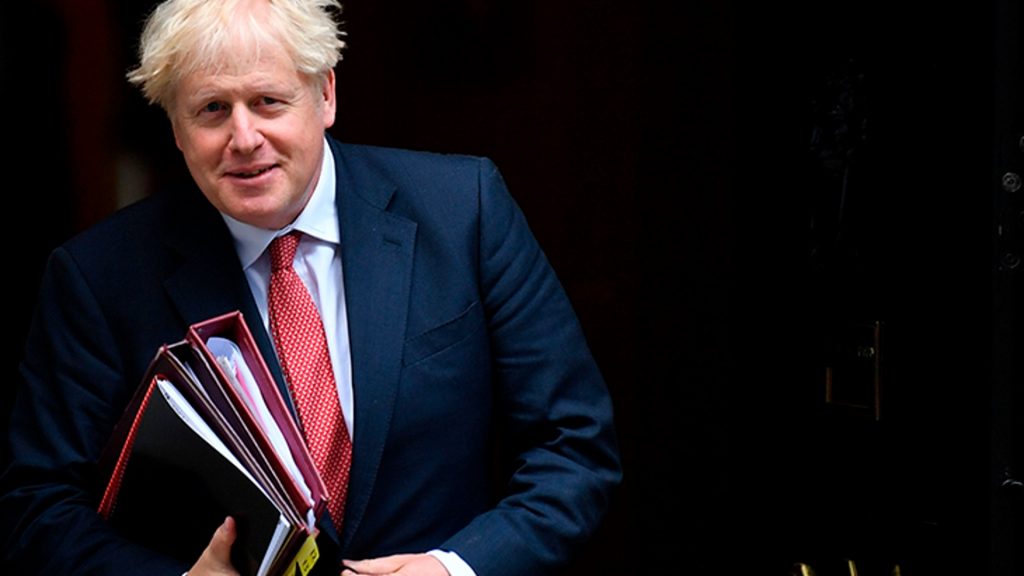
Toby adds his voice to the growing chorus of doubters about Boris in his Spectator column today.
What on earth happened to the freedom-loving, twinkly-eyed, Rabelaisian character I voted for? Oliver Hardy has left the stage, replaced by Oliver Cromwell. His government has even said it wants to lower the speed limit on motorways to 60 mph. Didn’t Boris once say that voting Tory will cause your wife to have bigger breasts and increase your chances of owning a BMW M3? Where did that guy go?
Can his lacklustre performance be blamed on the fact that he came down with a bad dose of Covid several months ago? Toby doesn’t think so.
This explanation is attractive to former Boris enthusiasts like me because it lets us off the hook. It’s not that we overestimated him; rather that he’s changed in a way we couldn’t have anticipated. But the difficulty with those theories is that his mishandling of the crisis predates his battle with COVID-19.
Few would dispute that he failed to give the pandemic the attention he should have done in January and February, time he could have spent devising an effective containment strategy. Come March, he was just buffeted by events, one minute saying we should ‘take it on the chin’, the next imposing a full lockdown. His lack of engagement with the detail, both before and after his spell in intensive care, means the Government’s response has been led by others around the cabinet table, like Matt Hancock, who seem to be wholly captured by a small coterie of scientific advisors who decided early on that Sars-CoV-2 was ‘the big one’ and have been unwilling to abandon that hypothesis in the light of all the evidence to the contrary.
Worth reading in full.











To join in with the discussion please make a donation to The Daily Sceptic.
Profanity and abuse will be removed and may lead to a permanent ban.